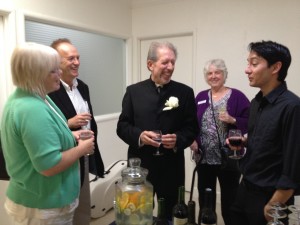
DAVID REQUIRO, right, and Maestro David Ramadanoff, center, at a post-concert reception Sunday at McCree-Goodeau Gallery.
S. Peterson photo
The concert opened with Modest Mussorgsky’s “Night on Bald Mountain,” composed in 1867 and arranged by Nikolai Rimsky-Korsakov in 1886. A tone poem, “Night” is based on the Russian legend of the Witches’ Sabbath on St. John’s Eve. The piece was not at all well received by Mussorgsky’s then-mentor, Mily Balakirev, the year it was composed, and it was never performed in Mussorgsky’s lifetime. Some years after his death, however, Rimsky-Korsakov revised the piece and presented the new orchestration to appreciative audiences.
“Night” begins with a bold declaration from the horns, erupting from a strong, buzzing base rhythm from the violin section. It is a frenzy of sound, well depicting a bacchanalian-style celebration of the “black god” of legend. The Vallejo Symphony’s tight string section carried the tone beautifully Sunday, setting up the horns for their grand entry. The action builds in energy until a church bell sounds, breaking the mood and leading to a mournful departure accentuated by a tender clarinet solo, beautifully rendered Sunday by VSO clarinetist Diane Maltester. Percussion also plays an important part in the piece, and all of those evocative beats were right on target Sunday.
Cellist Requiro was up next, performing the solo for Camille Saint-Saens’ Cello Concerto No. 1 in A Minor, composed in 1872. Requiro had the audience rapt from the start with his exquisite tone, and the orchestra followed his lead with beautifully nuanced conclusions to each of his themes. Requiro is a master of technique and feeling and brought expressive power and tenderness to the piece. Lucky for him, the Vallejo Symphony proved the perfect partner, fully tuned in to both Requiro’s timing and his emotion.
After a brief intermission, the symphony returned with Maurice Ravel’s “Pavane for a Dead Princess,” written in 1910. A pavane is a slow processional dance, and with this one Ravel is said to have been thinking of something a Spanish princess may have performed during the Renaissance — not, as might be assumed by the title, any sort of funeral procession. It is a rich and sweeping piece with a definite romantic flavor, replete with full, flowing sounds from all of the strings. Again, the string section performed remarkably, capturing the fullness of the piece with precision and pervasive feeling.
The concert concluded with a jaunty Gershwin piece, “An American in Paris,” composed in 1928. Maestro David Ramadanoff describes the piece as “really a collection of picture postcards.” Gershwin depicts with sound the adventures of an American tourist exploring the famous city. The composer himself described the piece as depicting the emotions of drunken melancholy, homesickness and exuberance alternately with blues, concluding in a spirit of revelry, the joy of taking part in a lively and passionate society.
The brass section provides a crucial element in “American,” and the VSO’s was a little sleepy Sunday, seeming to enter consistently late. The trombones stood out with some spunky sounds though, and all succeeded in evincing the happier moods within the piece. The best parts of the symphony’s performance of the Gershwin piece lay in the quiet moments, those requiring the highest level of attention and finesse. The orchestra seems to thrive on challenge in general, and somehow shines brightest in the most demanding passages.
It is always a treat to hear the Vallejo Symphony, led by Maestro Ramadanoff since 1983. Between the music selections, the featured guest soloists and Ramadanoff’s inspired leadership, one can always expect an impressive and entertaining performance. Sunday’s season opener was a good indication that this consistently high level of professionalism and responsiveness to contemporary audiences will most certainly continue this season.
Bravo, VSO, and many more.
If You Go
The next concert of the Vallejo Symphony will be “A Concert for the Animals,” featuring familiar music with animal themes by Respighi, Prokofiev, Rimsky-Korsakov and Saint-Saens, on Sunday, Jan. 25 at the Hogan Auditorium, 850 Rosewood Ave., Vallejo. Tickets are $15 to $35 and are available by calling the symphony office at 707-643-4441 or online at vallejosymphony.org.
Elizabeth Warnimont is a freelance writer specializing in the performing arts. She is also a substitute teacher for the Benicia Unified School District.





